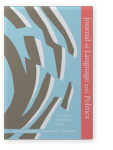Vol. 17:4 (2018) ► pp.461–484
“If indeed this is the will of the Ekiti people”
A discursive critique of a concession speech
Based on the idea that the quality of a democracy may be measured against the quality of its public communication, this paper deploys Critical Discourse Analysis (CDA) to investigate a Nigerian gubernatorial concession speech in discursive terms. It argues that as an uncommon genre in political discourse in an emerging democracy this hybridised speech both indexes a growing culture of ‘fair competition’ in Nigeria’s eighteen-year-old civilian rule and presents the incumbent as a deft political actor who strategically claims political capital. The paper examines the text’s generic structure, the political and other actors mentioned or implied in it, its manipulation of pronominal references for rhetorical effect, as well as the epistemic uncertainty implied by a query-concession sequence noticed in it. Drawing on the concession speech literature, the paper charts a course for studying the concession speech as an emerging genre in a neonatal democracy like Nigeria.
Article outline
- 1.Introduction
- 1.1A brief history of Nigeria’s Ekiti State and its political actors
- 1.2Critical discourse analysis: Some comments on Norman Fairclough’s approach
- 2.The concession speech as a focus of studies in political rhetoric
- 3.The gubernatorial election of June 21, 2014 and Governor Fayemi’s concession speech: Some notes on methodology
- 3.1The speech as part of a chain of social events
- 3.2Political and social actors in the speech
- 3.3Pronominal references in the speech: Including and excluding practices
- 3.4Construal of political and social actors in the speech
- 4.The strategic claiming of political capital and the speech as a hybridised genre
- 4.1Perceptions of political actors on the speech
- 5.Conclusion
-
Bibliography
